
The President of the United States of America, authorized by Act of Congress, March 3, 1863,
has awarded in the name of Congress the Medal of Honor to
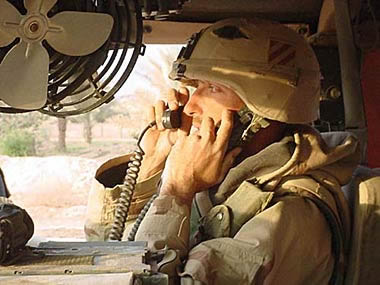
Paul Ray Smith
Rank and organization: Sergeant First Class, U.S. Army, Company B, 11th Engineer Battalion, 3d Infantry Division. Place and Date: Baghdad, Iraq, 4 April 2003. Entered Service at: Tampa, Florida. Born: 24 September 1969, El Paso, Texas
For conspicuous gallantry and intrepidity at the risk of his life above and beyond the call of duty:
Sergeant First Class Paul R. Smith distinguished himself by acts of gallantry and intrepidity above and beyond the call of duty in action with an armed enemy near Baghdad International Airport, Baghdad, Iraq on 4 April 2003. On that day, Sergeant First Class Smith was engaged in the construction of a prisoner of war holding area when his Task Force was violently attacked by a company-sized enemy force. Realizing the vulnerability of over 100 fellow soldiers, Sergeant First Class Smith quickly organized a hasty defense consisting of two platoons of soldiers, one Bradley Fighting Vehicle and three armored personnel carriers. As the fight developed, Sergeant First Class Smith braved hostile enemy fire to personally engage the enemy with hand grenades and anti-tank weapons, and organized the evacuation of three wounded soldiers from an armored personnel carrier struck by a rocket propelled grenade and a 60mm mortar round. Fearing the enemy would overrun their defenses, Sergeant First Class Smith moved under withering enemy fire to man a .50 caliber machine gun mounted on a damaged armored personnel carrier. In total disregard for his own life, he maintained his exposed position in order to engage the attacking enemy force. During this action, he was mortally wounded. His courageous actions helped defeat the enemy attack, and resulted in as many as 50 enemy soldiers killed, while allowing the safe withdrawal of numerous wounded soldiers. Sergeant First Class Smith’s extraordinary heroism and uncommon valor are in keeping with the highest traditions of the military service and reflect great credit upon himself, the Third Infantry Division “Rock of the Marne,” and the United States Army.
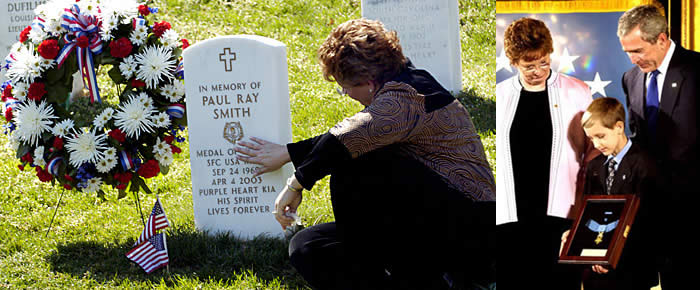

The President of the United States Takes Pride in Presenting The Air Force Cross To
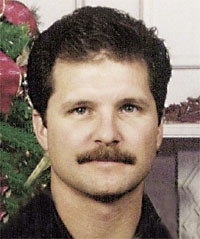
John Chapman T/Sergeant, U.S. Air Force For Services as Set Forth in the Following
Citation:
The President of the United States of America, authorized by Title 10, Section 8742, U.S.C., awards the Air Force Cross toTSgt John Chapman for extraordinary heroism in military operation against an armed enemy of the United States as a 24th Special Tactics Squadron, Combat Controller in the vicinity of Gardez, in the eastern highlands of Afghanistan, on 4 March 2002. On this date, during his helicopter insertion for a reconnaissance and time sensitive targeting close air support mission, Sergeant Chapman’s aircraft came under heavy machine gun fire and received a direct hit from a rocket propelled grenade which caused a United States Navy sea-air-land team member to fall from the aircraft. Though heavily damaged, the aircraft egressed the area and made an emergency landing seven kilometers away. Once on the ground Sergeant Chapman established communication with an AC-130 gunship to insure the area was secure while providing close air support coverage for the entire team. He then directed the gunship to begin the search for the missing team member. He requested, coordinated, and controlled the helicopter that extracted the stranded team and aircrew members. These actions limited the exposure of the aircrew and team to hostile fire. Without regard for his own life Sergeant Chapman volunteered to rescue his missing team member from an enemy strong hold. Shortly after insertion, the team made contact with the enemy. Sergeant Chapman engaged and killed two enemy personnel. He continued to advance reaching the enemy position then engaged a second enemy position, a dug-in machine gun nest. At this time the rescue team came under effective enemy fire from three directions. From close range he exchanged fire with the enemy from minimum personal cover until he succumbed to multiple wounds. His engagement and destruction of the first enemy position and advancement on the second position enabled his team to move to cover and break enemy contact. In his own words, his Navy sea-air-land team leader credits Sergeant Chapman unequivocally with saving the lives of the entire rescue team. Through his extraordinary heroism, superb airmanship, aggressiveness in the face of the enemy, and the dedication to the service of his country, Sergeant Chapman reflects the highest credit upon himself and the United States Air Force.
The President of the United States Takes Pride in Presenting The Air Force Cross To
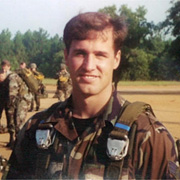
Jason Dean Cunningham Senior Airman, U.S. Air Force For Services as Set Forth in the Following
Citation:
The President of the United States of America, authorized by Title 10, Section 8742, U.S.C., awards the Air Force Cross to Senior Airman Jason D. Cunningham for extraordinary heroism in military operations against an opposing armed force while serving as a pararescueman near the village of Marzak in the Paktia Province of Afghanistan on 4 March 2002. On that proud day, Airman Cunningham was the primary Air Force Combat Search and Rescue medic assigned to a Quick Reaction Force tasked to recover two American servicemen evading capture in austere terrain occupied by massed Al Qaida and Taliban forces. Shortly before landing, his MH-47E helicopter received accurate rocket-propelled grenade and small arms fire, severely disabling the aircraft and causing it to crash land. The assault force formed a hasty defense and immediately suffered three fatalities and five critical casualties. Despite effective enemy fire, and at great risk to his own life, Airman Cunningham remained in the burning fuselage of the aircraft in order to treat the wounded. As he moved his patients to a more secure location, mortar rounds began to impact within fifty feet of his position. Disregarding this extreme danger, he continued the movement and exposed himself to enemy fire on seven separate occasions. When the second casualty collection point was also compromised, in a display of uncommon valor and gallantry, Airman Cunningham braved an intense small arms and rocket-propelled grenade attack while repositioning the critically wounded to a third collection point. Even after he was mortally wounded and quickly deteriorating, he continued to direct patient movement and transferred care to another medic. In the end, his distinct efforts led to the successful delivery of ten gravely wounded Americans to life-saving medical treatment. Through his extraordinary heroism, superb airmanship, aggressiveness in the face of the enemy, and in the dedication of his service to his country, Senior Airman Cunningham reflected the highest credit upon himself and the United States Air Force.

The President of the United States Takes Pleasure in Presenting The Distinguished Service Cross To
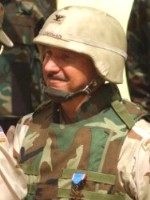
James H, Coffman Jr. Colonel, U.S. Army
Citation:
For exceptionally valorous conduct while assigned as the Senior Advisor to the 1st Iraqi Special Police Commando Brigade during a lengthy battle on 14 November 2004 in Mosul, Iraq, during which the unit likely would have been overrun were it not for the courageous leadership of Colonel Coffman and the one Commando officer not wounded. At approximately 1030 hours on 14 November, Colonel Coffman moved with a Commando Quick Reaction Force (QRF) to reinforce a Commando platoon under attack at the Four West Police Station in Mosul. As the QRF neared the besieged platoon, it came under intense rocket-propelled grenade, mortar, machinegun, and AK-47 fire by a large insurgent force. Over the next four hours, the enemy repeatedly assaulted the Commandos’ position, at times culminating their attacks twenty meters from Colonel Coffman’s location. With all but one of the commando officers killed or seriously wounded by the initial enemy fire, Colonel Coffman exhibited truly inspirational leadership, rallying the Commandos and organizing a hasty defense while attempting to radio higher headquarters for reinforcements. Under heavy fire, he moved from Commando to Commando, looking each in the eye and using hand and arm signals to demonstrate what he wanted done. At one point, an enemy round shattered Colonel Coffman’s shooting hand and rendered his M4 rifle inoperable. After bandaging his hand, Colonel Coffman picked up AK-47s from Commando casualties and fired them with his other hand until each ran out of ammunition. With the assistance of the one remaining Commando officer, Colonel Coffman redistributed ammunition among the uninjured commandos until he had only loose ammunition that he loaded by placing magazines between his legs and using his one working hand. Throughout this period, he repeatedly demonstrated exceptional courage and an extraordinary example to the commandos as they repulsed attack after attack by the enemy. Four hours after the start of the battle, a second Commando element arrived and Colonel Coffman guided them to his position. Even after their arrival, he continued to direct the fight, refusing to be evacuated until the enemy was defeated. Shortly thereafter, attack helicopters also arrived, followed closely by a Stryker Brigade QRF, and Colonel Coffman used Iraqi radios to direct air strikes and to provide vital information on the location of enemy and friendly forces. After supervising the evacuation of several dozen wounded Commandos, Colonel Coffman led a squad-sized element to the Four West Iraqi Police Station, fifty meters ahead of the Strykers, to make contact with the Commandos still in the station. After they linked up, the Strykers moved forward, and attack helicopters engaged the buildings occupied by the enemy, following which Colonel Coffman returned to his original position to ensure that all of the Iraqi casualties had been evacuated. Only then did he consent to be evacuated for surgery for his own serious wound. During the fierce four-hour battle, twelve Commandos were killed and 42 were wounded. Twenty-five enemy were killed and many dozens more were wounded.
The President of the United States Takes Pleasure in Presenting The Distinguished Service Cross To
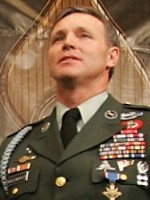
Donald R. Hollenbaugh Master Sergeant, U.S. Army
Citation:
For extraordinary heroism in action on 26 April 2004, during combat operations against an armed Iraqi insurgent force while supporting United States Marine Corps operations in Fallujah, Iraq. Master Sergeant Hollenbaugh demonstrated the highest degree of courage and excellent leadership through his distinguished performance as Team Leader while engaged in Urban Combat Operations. His heroic actions throughout one of the most intensive firefights of the Operation Iraqi Freedom campaign were directly responsible for preventing enemy insurgent forces from overrunning the United States Force. Master Sergeant Hollenbaugh personally eliminated multiple enemy-controlled weapon positions, essential in turning the tide of the enemy’s ground-force assault upon a United States Marine Corps Platoon. His actions under fire as a Leader were performed with marked distinction and bravery. Master Sergeant Hollenbaugh’s distinctive accomplishments are in keeping with the finest traditions of military service and reflect great credit upon himself, this Command, and the United States Army.
